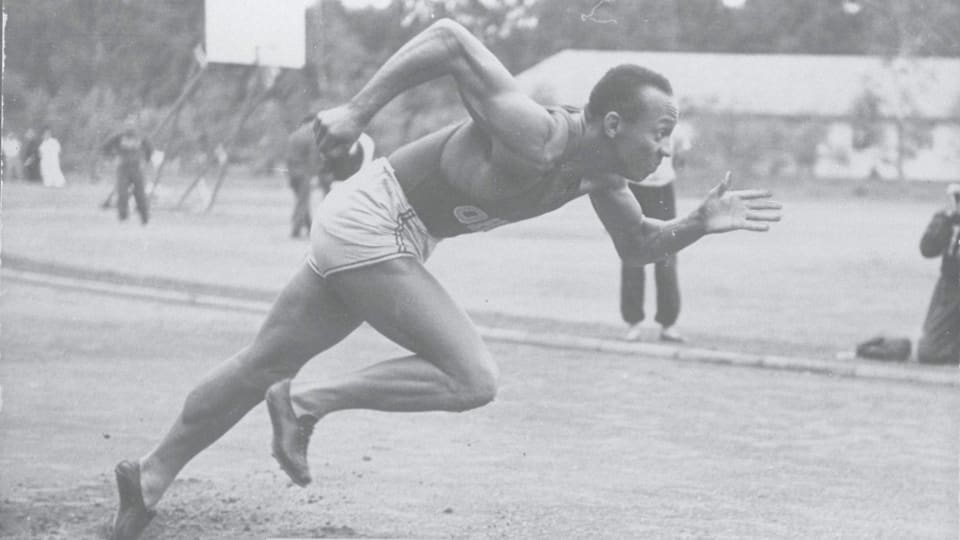Jesse Owens and the greatest 45 minutes in sport
On 25th of May 1935 the 21-year-old Owens averaged a world record every nine minutes at the Big Ten Championships. Five world leading marks and one world equalling effort, all completed with an injury severe enough for his coach to seriously consider pulling him out of the meet at the last minute.

Jesse Owens set five world records and equalled a sixth in 45 minutes. Yes, five world record-breaking performances and a world record-equalling one in three-quarters of an hour. It bears repeating.
While Owens won four gold medals in seven days at the Berlin 1936 Olympic Games – a truly momentous feat achieved in the face of genuine adversity – it has, in pure sporting terms, been matched. Compatriot Carl Lewis followed in Owens’ footsteps 48 years later by doing the 100m, 200m, long jump and 4x100m quadruple at the Los Angeles Games. In contrast, Owens’ efforts in Ann Arbor, Michigan, on 25 May 1935 at the Big Ten Championships (a leading annual USA intercollegiate athletics meet) stand alone in all sport.
Here, we take an in-depth look at what Michael Johnson, the four-time Olympic champion and the only man ever to win a 200m/400m double at an Olympic Games, described as “one of the most amazing feats in any sport”.
The injury
Five days before the Big Ten Championships, Owens fell down the stairs of his dormitory at Ohio State University. A badly bruised lower back made him an immediate doubt for the upcoming meet.
The Alabama man’s physical condition had not improved much by the morning of 25 May. According to reports at the time, the sprint star had to be helped in and out of the car in which some of the team had travelled to Ann Arbor. Once onsite, Owens could barely bend enough to touch his knees. He even took a 30-minute hot bath as a final attempt to loosen his limbs.
Ultimately, Larry Snyder, the Ohio State coach, agreed to let his charge compete only on the agreement that they assess his condition on an event-by-event basis. It proved an astute call.
15:15 100 yard dash – 9.4 seconds – equalled the world record
Having been unable to warm up or stretch, Owens said later that as he settled on his haunches for the 100, the pain he had been feeling “disappeared, as if by a miracle”. There was certainly something divine about what came next.
Slow at the start, Owens got into his smooth flowing stride quickly and was ahead by the 30-yard mark. He crossed the line in 9.4 seconds, equalling the world record.
An interesting aside reported by Sports Illustrated, is that more than half the official timers actually clocked Owens at 9.3 seconds. But the rules of the day stipulated that each runner got attributed the slowest time recorded. No one would run 9.3 seconds for another 13 years.
15:25 long jump – 8.13m – world record No.1
Owens’ schedule posed considerable logistical challenges, so considerable in fact that the 21-year-old knew from the beginning that he would only have time for one attempt at the long jump.
One proved enough. Owens flew down the runway and soared out to a breath-taking 8.13m. The first man to breach the 8m barrier, Owens had broken the world record by a massive 15cm – only Bob Beamon with his legendary leap at the Mexico City 1968 Olympic Games has ever extended the world-leading mark by more.
Owens’ record stood for 25 years and would have placed him sixth in the Rio 2016 Olympic Games finals, some 81 years later.
15:34 220 yards dash (200m dash) – 20.3 seconds – world records No. 2 & 3
Less than 10 minutes after setting a world record that would stand for a quarter of a century, Owens lined up for the 220-yard dash. In the USA this distance, until the 1960s, was often run in a straight line, with times also taken for the straight 200m.
The graceful, free-flowing Owens reportedly finished so far clear of his opponents that it looked like he was running on his own. He smashed the world record by three-tenths of a second, finishing in 20.3 seconds. With the 200m mark in his pocket too, it was two world records in one race.
16:00 220 yard low hurdles (200m low hurdles) – 22.6 seconds – world records No.4 & 5
Owens arguably saved the very best until last. Some special athletes have combined sprinting with long jump. The 22-year-old Jarrion Lawson, fourth in the long jump at the Rio 2016 Games and 2016 NCAA 100m and 200m champion, is the latest in a line that also includes Carl Lewis. But almost no athlete has been a sprinter, jumper and a hurdler.
In front of 5,000 or 10,000 (depending on who you ask) by now very excited fans packed in to the Ferry Field stadium, Owens, bad back and all, pulled off his tracksuit for a fourth time.
Exactly 22.6 seconds later he was holder of two hurdling world records. The first man to break 23 seconds, Owens was almost 5m ahead of his nearest rival.
Finally finished, the young superstar had to climb out of the changing room to escape his besotted fans. Of all his achievements, none can compete with those magical 45 minutes.